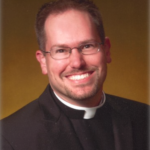7/15/2022
A Place for Everyone?
 Rich Andre, CSP
Rich Andre, CSP
July 15, 2022
 Rich Andre, CSP
Rich Andre, CSP
July 15, 2022
On most days when I preside at the Eucharistic Prayer, I invoke the names of three saints in particular: Mary of Magdala, Oscar Romero, and Phoebe. Mary of Magdala is a long-time Paulist patron saint for evangelization. Since her feast day is this Friday, July 22, I have asked Maria Cataldo-Cunniff to give a reflection at our 7:55 am Mass that day. Please join us if you can. Last month, the Paulists named Oscar Romero as a patron saint, presumably because he is a contemporary martyr for social justice in the western hemisphere. I consider Phoebe of Cenchreae to be a patron saint for women who have leadership skills to share with the Church. She was the deaconess and businesswoman who delivered Paul’s Letter to the Romans. She likely interpreted the letter for the Roman Christians, too, as portions of it are difficult to understand.
A few months ago, when I realized that the story of Martha and Mary was going to be the gospel reading one of the first weekends that I served at the Paulist Center, I was excited to preach that weekend on the role of women in the Church. If you’re curious, here’s what I preached on this gospel three years ago: A Woman’s Place Is… Where? Alas, I am not preaching this weekend, but if I were, I would need to mention some of the steps Pope Francis has taken in the past three years to include women in leadership roles at the Vatican. (See here, here, and here for examples.)
I concluded my homily three years ago by asking three questions: “Who isn’t in the room when important decisions are being made in the Church? What are the reasons that other voices aren’t involved in the decision? In this day and age, do those reasons still make sense?”
These questions do not just apply to women who have limits placed on their leadership roles within the Church, but to all kinds of people who have traditionally been excluded from leadership in a variety of institutions: those who are of a different age, skin color, ethnicity, economic status, education level, sexual orientation, physical ability, mental health status, language group, immigration status, or political belief from the majority of the other leaders. At the Paulist Center, we are ardent advocates for including and welcoming the groups typically on the peripheries, but we seem to make less effort to welcome other groups. More sadly, in the past few weeks, I have heard stories from very active members of the Paulist Center Community who tell me that it took them years to feel welcome here, because some community members were so focused on catching up with the dear friends they already had in this community, that they only gave a perfunctory “hello” to newcomers. I’m not accusing anyone of something that I don’t struggle with myself. It’s difficult to balance our efforts between nurturing the bonds we already have in a community while also forming new bonds with others. Nevertheless, let us pray that we can each genuinely welcome the stranger as Jesus calls us to! (Ref. Matthew 25:35 and 43.)
As we move forward, let us continue to ask questions about our own social networks within the Paulist Center Community, not just about the leadership of the wider Church:
![]()
Rev. Richard R. Andre, C. S. P.